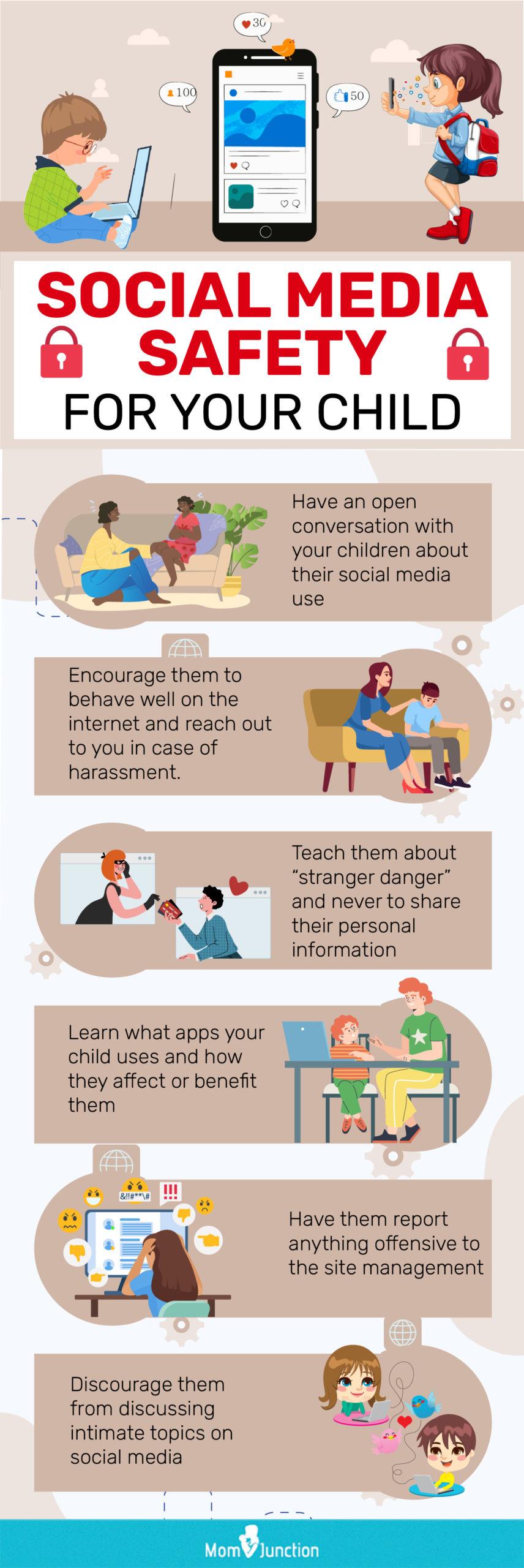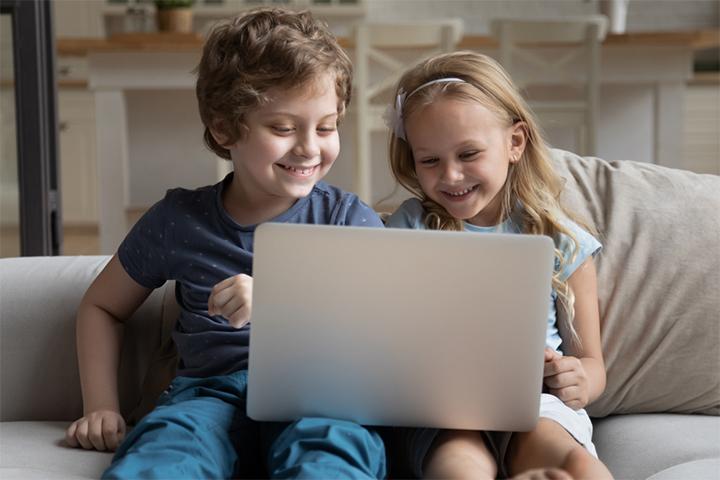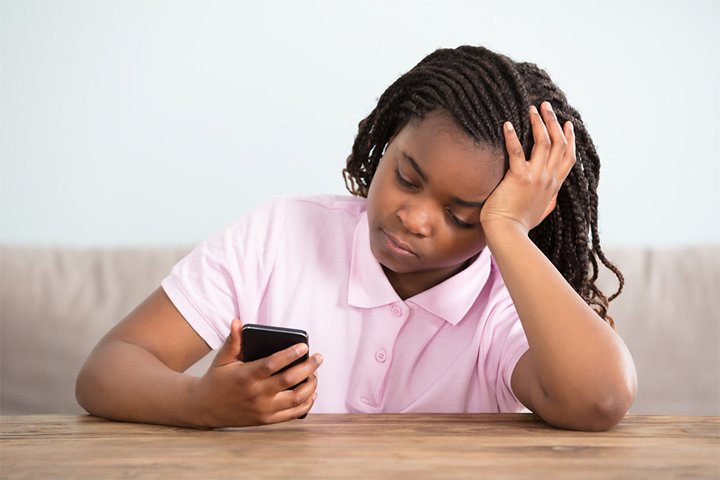The Impact Of Social Media On Children: Positive & Negative
Social media is a fast-emerging platform that has changed how people communicate and connect. Since these networking platforms are easy to use and entertaining, they have attracted the attention of most children. Therefore, it becomes essential to discuss the effects of social media on children. Social media, if used wisely, is a good platform to interact, learn, communicate, and have fun; however, if misused or excessively used, it may lead to cyberbullying, anxiety, and health problems. So, before allowing your children to access social media, you should be aware of its functionalities, privacy settings, and age limit. This post discusses social media’s positive and negative effects and tips to keep your children safe.
In This Article
What Is The Right Age For Children To Be On Social Media?
Do not allow your child to access social media before adolescence independently. Even after adolescence, the age limit for using different networking sites will differ to avoid adverse effects (1).
- Children of 13 years and above: Facebook, Twitter, Tiktok, and Youtube
- Children of 16 years and above: Whatsapp, LinkedIn, and Myspace
- Children of 18 years and above: Monkey, MeetMe, and Tagged
What Are The Effects Of Social Media On Children?
According to Pew Research Center’s last survey, 95% of teenagers have easy access to smartphones, and 45% are almost online all the time. Therefore, controlling their usage can become challenging (2). Before trying to control their social media activities, parents need to be aware of its positive and negative effects.
Positive Effects Of Social Media On Children
Social media helps you link up with people all over the world. The positive influence of social media on children include (3) (4):
- Helps to connect with extended family and friends
- Helps develop better perspectives on various issues
- Enables them to learn new things, exchange ideas, and hone their networking skills
- Provides an effective platform for enhancing your child’s knowledge
- Helps children get involved in charitable activities and campaigns
- Motivates children to get better at communication and encourages freedom of self-expression
- Helps connect with educators and facilitators from different parts of the world
- Get emotional support from people during difficult times
- Facilitates the development of technical expertise and practical understanding of technology in your child
Point to Ponder
Denying your children of any screen time exposure may not be a practical solution. Social media also helps children learn how to navigate relationships and handle bullies and unkind people (11)
Negative Effects Of Social Media On Children
Young minds are moldable, and social media can affect how your child thinks or behaves. At their age, they are innocent and cannot discern good and bad. Some common adverse effects may be (5) (6):
- Social media is a vast platform, and one cannot control the amount of information available here. Therefore, children may bump into inappropriate or harmful content that may affect their thinking.
- Cyberbullying is a growing trend prevalent on social media and messaging platforms. It spreads fear and shame among people and may have undesirable effects on children.
- Makes children less productive because much of their time is spent without doing anything important, and they become addicted. These addictions may adversely affect their physical health.
- Excessive social media use may also affect your child’s ability to develop interpersonal relationships.
Caution
Dangerous viral trends, false marketing, and online predators are other dangers of social media (11)
Jackie Darby, a licensed clinical psychologist and certified group psychotherapist from Washington, District of Columbia, says, “The first area of risk of the apps is that they ask for location permission which can put the individual at risk of being tracked. The second area of risk is that the person can give out information, which makes it easy for hackers to steal their identity. The third risk is toward self-esteem. Studies have shown that overuse of social media can lead to lower levels of self-esteem in children because they are comparing themselves to unrealistic images. The last area of risk is the exposure to adult content.”
How To Help Your Children Be Safe On Social Media?
Since social media has considerable adverse effects, parents need to be vigilant about the safety of their children. “The best way to give advice to children about social media is to remind them that it is a tool to connect with others. It is not the end all be all for their existence. Additionally, help them understand the safety measures that are in the apps to stay protected from people. Scare tactics should not be used because they can be traumatizing to the child,” recommends Darby.
The following guidelines could be of help (3) (7):
- Talk to your children and help them understand that your involvement in their social media interactions is not about invading their privacy but ensuring their safety.
- Let your children know they should maintain good conduct over social platforms. Also, they should inform you immediately if they face harassment or cyberbullying issues.
- Ensure that your children do not interact with strangers or share much personal information on social media.
- Conduct research on the popular apps your children may be using and learn their functionalities, so you may know how it affects them.
- Ensure that children report to the site management about anything offensive they receive through online viewers.
- Encourage your children not to discuss about intercourse or lovemaking with anyone on social media.
- Alert them about online scams.
- If you suspect your child is being harassed, contact the police or the child protection center.
Frequently Asked Questions
1. Is social media toxic?
The effect of social media on children may be toxic in case of excessive usage. According to the research, more than three hours of social media in a day may cause anxiety and depression in teens. Moreover, the life that people portray on social media may lead to comparisons, causing low self-esteem in children. In addition, children keeping their phones by their sides while sleeping are often distracted by their notifications and bright light, leading to poor sleep (8).
2. What are social media recommended settings for children’s safety?
The social media privacy settings for children include (9) (10):
- Screen name: Use your full name, first name, or a pseudonym.
- Profile picture: Choose a profile picture that represents you positively. You may even choose a graphical picture instead.
- Contact information: It is safe to create a separate email address for social media profiles.
- Identity: Create an identity you want to portray publicly by customizing your information.
- Manage the people who can view the posts, comment on them, or tag them.
3. How does social media affect children’s mental health?
Excessive internet and social media use have been linked to various mental health issues in children such as depression, poor sleep, increased physiological arousal, decreased attention, hyperactivity, aggression, antisocial, fearful behavior, social isolation, and anxiety about conforming to social norms (12).
4. Is social media good for students?
As with any other technology, social media has no absolute labeling, terming it as either good or bad. When used judiciously and to enhance knowledge, it is a great medium for sharing, learning, and exploring new information. However, there is no denying that it may harm students due to its potential misuse and addiction.
As a parent, you should ensure your child spends quality time on social media websites and reaps positive outcomes. Keep a tab on the effects of social media on children and be watchful of the sites they access. Educate your child about the pros and cons of these networking sites. You may visit a therapist if you find your child too withdrawn, moody, or excited due to a lack of social media access. Let’s make social media a fun, educating, and positive experience for children.
Infographic: How To Help Children Be Safe On Social Media
You shouldn’t completely block social media from your children’s lives, as it is essential to stay updated with the world. But how do you protect them from the evils of the internet? This infographic has a few pointers to help you enlighten your children on social media safety. Save
Save
Get high-quality PDF version by clicking below.

Key Pointers
- Social media may seem attractive to children; however, they should not use it independently before turning 13.
- Social networking platforms can help connect with friends and family; on the other hand, interacting with strangers may have adverse effects.
- Parents may ensure their children stay safe online by educating them about the proper social media usage and involvement in their online activities.
References:
MomJunction’s articles are written after analyzing the research works of expert authors and institutions. Our references consist of resources established by authorities in their respective fields. You can learn more about the authenticity of the information we present in our editorial policy
- At what age can my child start social networking?
https://www.internetmatters.org/resources/what-age-can-my-child-start-social-networking/ - Teens Social Media and Technology 2018.
https://www.pewresearch.org/internet/2018/05/31/teens-social-media-technology-2018/ - Teaching Kids to Be Smart About Social Media.
https://kidshealth.org/en/parents/social-media-smarts.html - Social Media and Mental Health.
https://www.helpguide.org/articles/mental-health/social-media-and-mental-health.htm - The Effects of Social Media on children.
https://www.oercommons.org/authoring/25400-the-effects-of-social-media-on-children/view - Cyberbullying: What is it and how to stop it.
https://www.unicef.org/end-violence/how-to-stop-cyberbullying - Social media online gaming and keeping children safe online.
https://www.nidirect.gov.uk/articles/social-media-online-gaming-and-keeping-children-safe-online#toc-2 - What doctors wish patients knew about social media’s toxic impact.
https://www.ama-assn.org/delivering-care/population-care/what-doctors-wish-patients-knew-about-social-media-s-toxic-impact - Using social networks safely.
https://edu.gcfglobal.org/en/internetsafetyforkids/using-social-networks-safely/1/ - Setting up social media.
https://www.internetmatters.org/connecting-safely-online/advice-for-parents/do-the-basics-on-social-media-to-support-young-people/setting-up-social-media/ - Effects of Social Media on Children.
https://health.clevelandclinic.org/dangers-of-social-media-for-youth/#:~:text=In%20addition%20to%20problematic%20digital,Lack%20of%20self%2Desteem - Emily Frith; (2017); Social media and children’s mental health: a review of the evidence.
http://epi.org.uk/wp-content/uploads/2018/01/Social-Media_Mental-Health_EPI-Report.pdf
Was this article helpful?


















![Toni Kroos là ai? [ sự thật về tiểu sử đầy đủ Toni Kroos ]](https://evbn.org/wp-content/uploads/New-Project-6635-1671934592.jpg)


